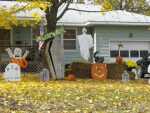Fright night!

By Colette Lefebvre-Davis
Nevada Daily Mail
The origins of Halloween have been distorted in recent years, prompted by each unique entity's agenda. Halloween, originated by way of the ancient Celtic festival of Samhain (pronounced Sow-in). The Celts, who lived 2,000 years ago in what is now Ireland, the United Kingdom and France, celebrated their new year on Nov. 1. This was the end of summer, and the beginning of harvest, with a look towards the dark days ahead. Winter was often times a season associated with human death. The Celts believed that on the night before Samhain, the boundary or veil between the world of the living and the dead grew thin. On the night of Oct. 31, the ghosts of the dead were said to return to earth.
Ghosts were believed to cause all kinds of havoc, from damaging crops to trickery. The druid priests would build huge bonfires where the people would gather to burn crops and animals as sacrifices to the Celtic deities. During the celebration, the Celts wore costumes, when the celebration was over they re-lit their fires, which they had extinguished earlier in the evening.
When the Romans conquered the Celts in A.D. 43, they brought with them Roman traditions. Four hundred years of Roman rule, influenced the Celtic people. The Roman holiday Feralia, was the day that Romans traditionally commemorated the passing of the dead. The other holiday, was a day to honor Pomona, the Roman goddess of fruit and trees, the symbol of Pomona is the apple and the incorporation of this tradition with the Celtic festival of Samhain, could explain, the modern day game of bobbing for apples.
As the influence of Christianity spread throughout Celtic lands, the face of Samhain changed drastically. Pope Boniface IV, designated Nov. 1 as "All Saints Day," a time to honor saints and martyrs. is widely believed today that the celebration was called All-hallows or All-hallowmas (from middle English Alholowmesse which means All Saints Day) and the night before it, the night of Samhain, began to be called All-Hallows Eve and eventually Halloween.
